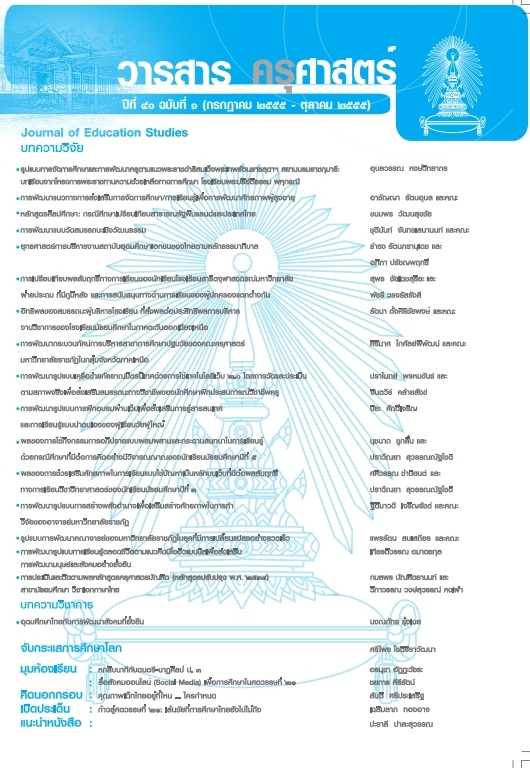การพัฒนารูปแบบการเรียนรู้ตลอดชีวิตตามแนวคิด นีโอฮิวแมนนิสเพื่อส่งเสริมการพัฒนามนุษย์และสังคมอย่างยั่งยืน
Keywords:
รูปแบบ, การเรียนรู้ตลอดชีวิต, แนวคิดนีโอฮิวแมนนิส, Sustainability, Lifelong Learning, C ConceptAbstract
งานวิจัยมีวัตถุประสงค์เพื่อนำเสนอรูปแบบการเรียนรู้ตลอดชีวิตตามแนวคิดนีโอฮิวแมนนิสเพื่อเสริมสร้างการพัฒนามนุษย์และสังคมอย่างยั่งยืน การวิจัยนี้เป็นการวิจัยเชิงคุณภาพโดยการศึกษาเอกสารงานวิจัยที่เกี่ยวข้อง การสัมภาษณ์ การสังเกต และการสนทนากลุ่มผู้ทรงคุณวุฒิจำนวน ๑๐ คน
ผลการวิจัยพบว่า ๑) มีการนำแนวคิดแนวคิดนีโอฮิวแมนนิสมาใช้ในการจัดการศึกษาแต่ละระบบได้อย่างมีประสิทธิภาพทั้งในการศึกษาในระบบ การศึกษานอกระบบ และการศึกษาตามอัธยาศัย สามารถทำให้ผู้เรียนมีคลื่นสมองตํ่า มีภาพพจน์ด้านบวกของตัวเองสูงขึ้น และมีแนวทางในการดูแลสุขภาพตนเองได้ดีขึ้น ๒) รูปแบบการเรียนรู้ตลอดชีวิตตามแนวคิดนีโอฮิวแมนนิสเพื่อส่งเสริมการพัฒนามนุษย์และสังคมอย่างยั่งยืนมีรูปแบบการจัดการศึกษาที่ชัดเจน ประกอบด้วย เป้าหมาย และหลักการที่คล้ายกัน แต่มีกระบวนการแตกต่างกัน และ ๓) แนวทางการนำรูปแบบการเรียนรู้ตลอดชีวิตตามแนวคิดนีโอฮิวแมนนิสไปใช้ปฏิบัติในบริบทสังคมไทยสามารถนำไปปรับใช้ได้ใทุกบริบทของการเรียนรู้ในสังคมไทย โดยองค์ความรู้ที่ได้สามารถนำไปกำหนดเป็นยุทธศาสตร์การพัฒนามนุษย์และสังคม และใช้เป็นข้อมูลสำคัญสำคัญผู้สนใจในการจัดการเรียนรู้ตลอดชีวิตเพื่อนำไปศึกษาหรือทำวิจัยต่อไป
The purposes of this qualitative research study were to propose a model of lifelonglearning based on the Neo-Humanist concept for sustainable human and societydevelopment. The data were gathered and analyzed using content analysis from differentbest-case studies in applying the Neo-Humanist concept; including interviews, observation,and focus group discussion with 10 experts in the fields.
The research findings were as follows. 1) Several findings from formal, non-formal,and informal education have been proven in regards to the effectiveness of the Neo-Humanistconcept in promoting and supporting total person development, including development ofthe body, mind, soul, spirit, and level of intelligence. 2) The study on the development ofa lifelong learning model based on the Neo-Humanist concept for sustainable human andsociety development comprised of three different types of educational systems: formaleducation, non-formal education, and informal education. Each educational system hassimilar goals and principles, but different processes.3) The developed model can beapplied or implemented in all contexts of learning in Thai society. Therefore, it isanticipated that the findings will 1) add meaningful information and practical guidelinesto develop personal and societal sustainability, 2) contribute to ensure the quality ofsocial participation and the balanced and sustainable development of both individualcommunities and society as a whole, as well as 3) serve as a basis for further research.
คำสำคัญ: รูปแบบ การเรียนรู้ตลอดชีวิต แนวคิดนีโอฮิวแมนนิส
Keywords: Sustainability/ Lifelong Learning / C Concept




